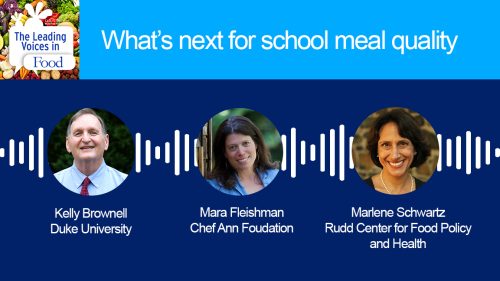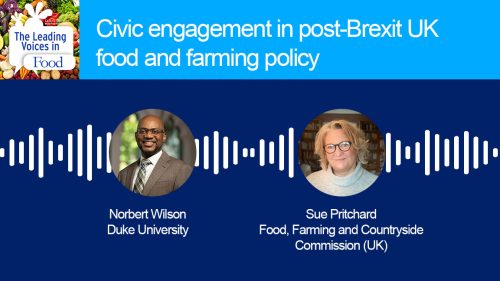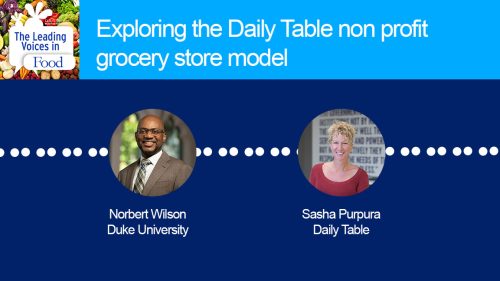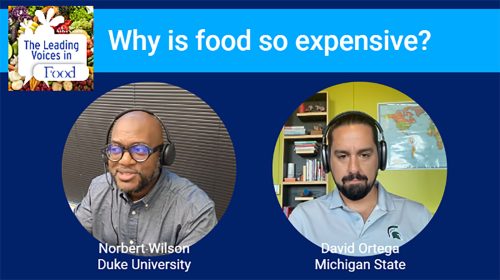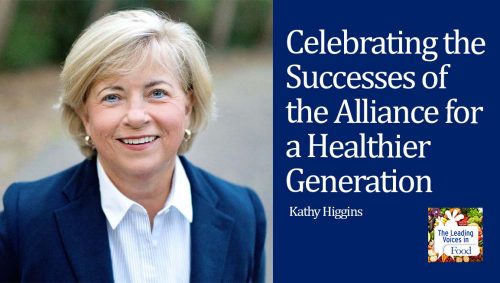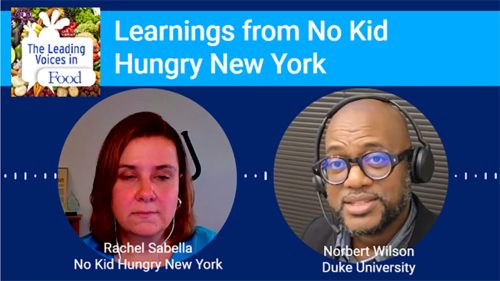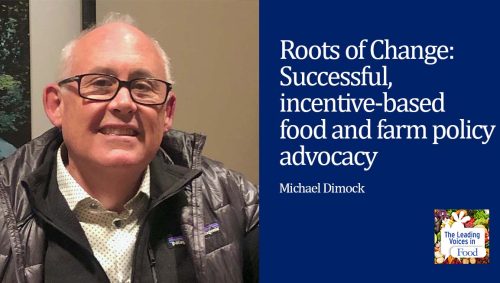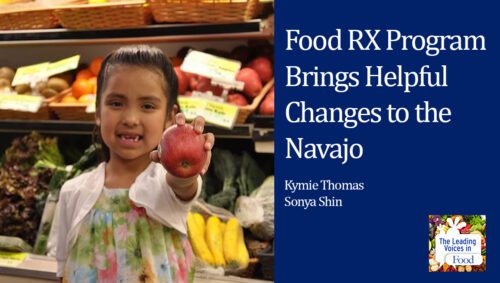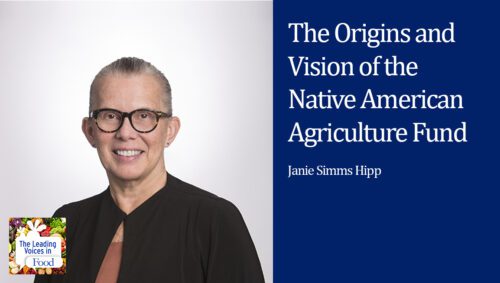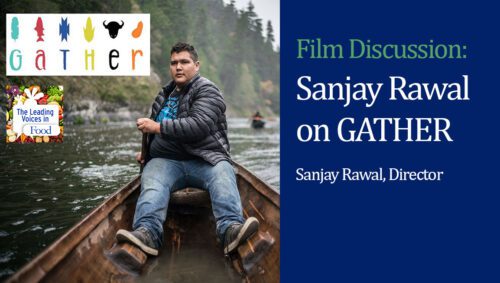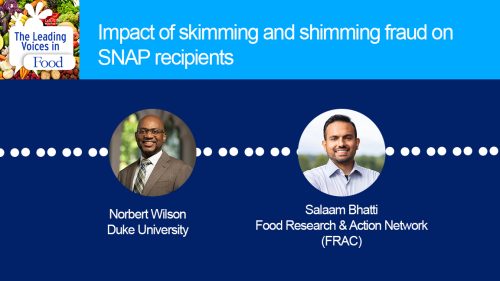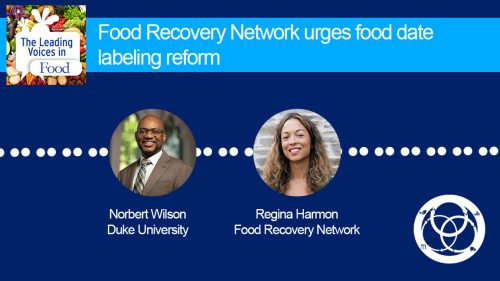E151: MAZON’s support for Indian Food Sovereignty, Puerto Rico, and Quick Response Food Advocacy
We’re speaking today with Mia Hubbard, vice president of programs at MAZON, a Jewish response to hunger, which is a national advocacy organization working to end hunger among people of all phase and backgrounds in the United States and in Israel. This is the fifth and final episode in our series partnership with MAZON. This time we will focus on the organization’s work to increase access to nutritious foods in the charitable food network.
Subscribe: Apple Podcasts | TuneIN | YouTube Music | SoundCloud | PocketCasts | Radio Public
Tags: Advocacy & Food | COVID-19 Pandemic Impacts on Food | Equity, Race & Food Justice | First Nations Food Issues | Food Insecurity |
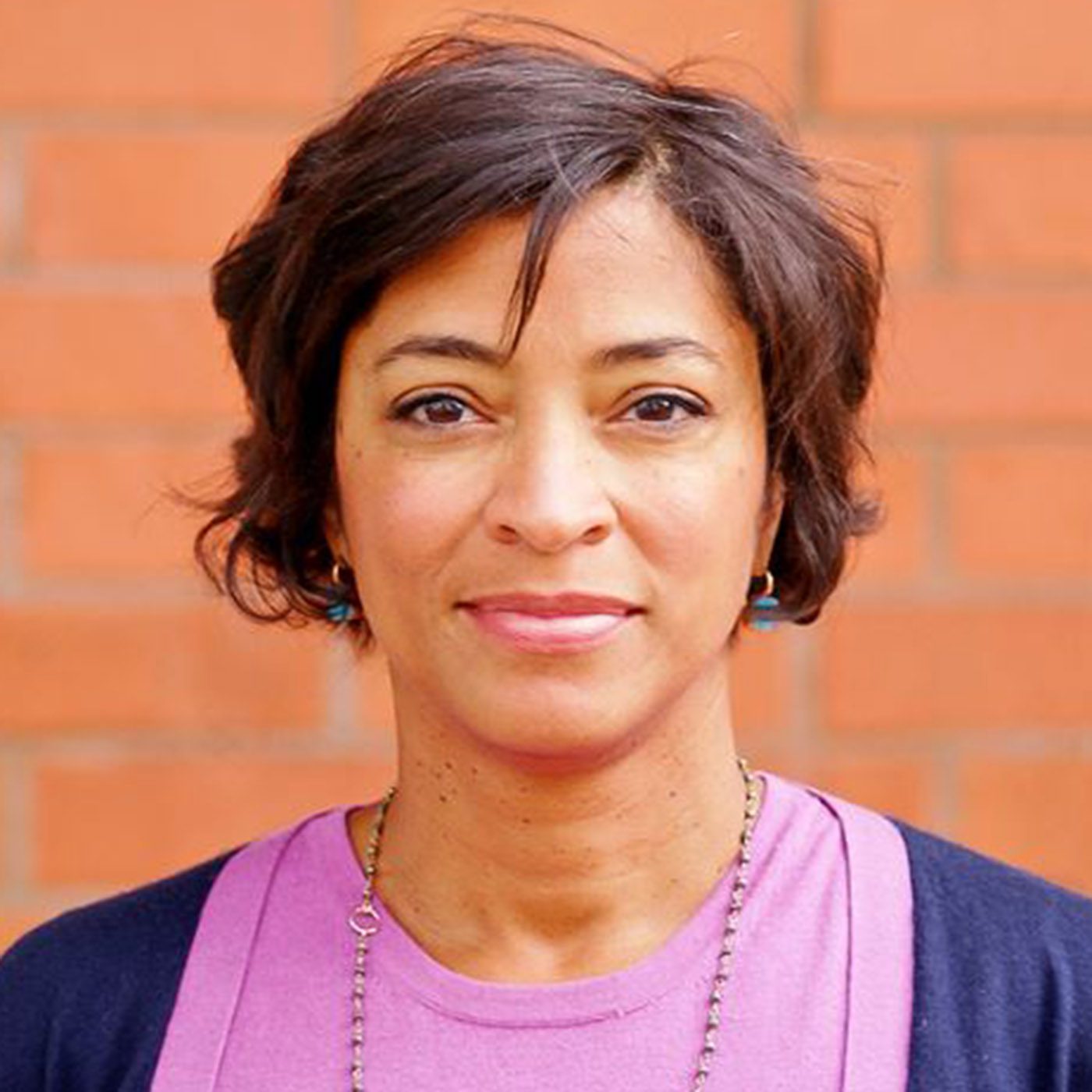
Mia Hubbard is the vice president of programs at MAZON. She provides leadership and direction for MAZON’s advocacy, grantmaking, and strategic program efforts to reduce and eliminate hunger and expand low-income communities’ access to healthy food in the United States and Israel. Since Mia joined the organization in 1993, MAZON has established itself as a leading advocate, funder, and capacity builder in the field of hunger as well as a critical source of expertise, leadership, and inspiration for advocacy and public policy solutions to hunger. Mia has served on several boards of directors, including most recently as the international program committee chair for an international association of food and nutrition programs serving people living with HIV/AIDS. Mia holds an M.A. in International Relations and Public Policy from the Graduate School of International Relations and Pacific Studies at UC San Diego and a B.A. in International Relations from Stanford University.
Interview Summary
Now let me start off with this question so I understand that MAZON has for quite a long time provided partnership grants to state and local organizations fighting hunger in their communities, but in 2018 MAZON refocused this grant making in states specifically with the highest rates of food insecurity. Can you please speak about this pivot that the organization made? How was it decided? And what’s been the impact of this decision?
So our grant making for the first 25 years or so really focused on advocacy and on the need for strong government response to hunger with this understanding that charity has an important role to play, but it is not set up to address this issue. And it’s really government food programs that have the capacity and the reach and the ability to address this issue at the scale that’s needed. So in our early years, we focused on prompting the anti-hunger field to understand the need for advocacy and policy change directed at improving government programs. And we did that through our early years of grant making. So we’re known for funding anti-hunger advocacy organizations, helping them to seed and grow and supporting their work. And helping to establish this country’s network of state level anti-hunger organizations that were doing advocacy at both the state and national level.
And then in 2018, we really decided we wanted to take a step back and re-examine our grant making and see if there were some new opportunities for MAZON to uniquely contribute to the field. And by that time the nation had a very strong anti-hunger advocacy infrastructure in place. And a really solid group of organizations working at the national level on developing drawn government food policies and programs. And a broad network of state-based organizations doing the same at the state level. So one of the things that became clear is that there still were some states that had relatively weak advocacy capacity. There wasn’t as much advocacy engagement taking place in those states and not surprisingly, these were also some of the most food insecure states. We decided at the time we would target our grant making to just a handful of the top food insecure states where advocacy capacity could be grown and created what we the Emerging Advocacy Fund, which is providing three-year funding to organizations in these food insecure states to create the capacity. And really what it means is to hire staff, to be able to do the advocacy work that needs to be done in those states. And we call it the EAF program. So our EAF partnerships are largely concentrated in the Southeast, and we have some partners in the Midwest and some other parts of the country. But primarily in the Southeast and you know it turns out that these are states that tend to be deeply conservative. They tend to be states that are politically and socially hostile, in some instances, to public benefit programs like SNAP, formerly known as the food stamp program. So unfortunately these are also the same states that are likely to benefit the most from these programs. Participation among those who are SNAP eligible in these states tend to lag behind the national average. So folks aren’t getting the resources they need to be able to feed themselves, and the state is leaving precious hunger fighting resources in DC, rather than having that money being circulated in their local economy, as people are using their SNAP dollars to buy food. The goal of the EAF program is really to help close that capacity gap and to enable organizations to hire staff who can do the advocacy to really make the case for these programs and supports.
I think we saw in the last 18 months, the economic fallout from COVID generated a really large surge in hunger. These organizations and these advocates, were in a great position to be able to educate their congressional representatives about how COVID was impacting food insecurity in their state. They were able to contribute to national advocacy that helped generate all of the support and funding that came out of federal relief packages, and then to work with their governors and state officials to encourage them to take advantage of all the federal waivers and flexibilities, and options that states had available to them during those early months of COVID to get resources quickly into the hands of food insecure people. And so we didn’t predict that COVID was going to happen, but these grants turned out to be timely investments and enabled advocates in states that were already struggling with high levels of food insecurity be able to better respond to the needs during COVID.
Mia can we talk about one of MAZON’s priority areas in particular – your concentration on strengthening food security and also food sovereignty in Indian country. So why have you chosen to invest so much in this issue and where and how do you think your organization can have the greatest impact?
You know MAZON is known for our focus on advocating for equal access to food for populations that have been historically ignored in policy arena. So we advocate on a lot of different populations including active duty military, single mothers, Americans in Puerto Rico, and also in indigenous communities. Our work in Indian country is focused on food sovereignty in recognition of the fact that tribes are sovereign nations and our work should be contributing to the ability of those nations to regain autonomy over their food systems and for tribes to be able to feed their own citizens. So we have learned very quickly in our work in Indian country that US food programs, government food programs are an important part of the food safety net. But we also know that the US has a long and troubled history in Indian country and that government food programs have been used as a tool of colonization. So we are working to advocate for improvements in these programs, but we’re also working for a day when they are less needed. And where tribes can have greater control over these programs and how they operate, that’s why MAZON joined the native farm bill coalition back in 2017 to be able to advocate and join over 170 tribes, to be able to advocate on behalf of tribal nations that were interested in being able to administer these programs on their own. We were the first actually non-native organization to be a part of the coalition. We’re very excited about our role is as a non-native ally in this field, we weren’t able to get that provision in the farm bill, but there were some other successes and in fact, there were 63 tribal specific provisions in the bill, which is the largest number in the history of the farm bill.
So we’re very excited about the work that we’re doing alongside our partners in Indian country. If you’ll indulge me I just want to mention their names. It’s the indigenous food and agriculture initiative, Intertribal Agriculture Council and the Native Food and Nutrition Resource Alliance. We are doing advocacy alongside these partners and we’re also funding them, really in recognition of the fact that government and foundation funding really isn’t going to native communities and causes. Less than half of 1% of foundation dollars go to Indian country. So we’re really excited to be able to support their ongoing advocacy and policy work.
That’s really is important work. So let’s talk about other important work that you’re doing. And I know that MAZON recently announced new partnership grants in Puerto Rico signaling that the organization is interested in addressing equity for those facing hunger in the territories. So why was this an important decision, particularly at this time? And what do you hope to achieve through this?
So Puerto Rico is a very exciting addition to our emerging advocacy fund. And we’re currently supporting three partners there on the island. These grants are part of MAZON larger advocacy effort around food security in Puerto Rico. It’s one of our top public policy areas and priorities where we’re really trying to advocate for equal access to federal food programs for Puerto Rico. So as you may know Puerto Ricans are US citizens, but they don’t have the same kind of access to federal programs that are intended to help vulnerable Americans and in the case of Puerto Rico, they are specifically barred from the SNAP program. I mean in the 1980s, the Reagan administration removed Puerto Rico from the SNAP program and created a separate program called the Nutrition Assistance Program (NAP), which is a block granted limited funded program, which provides food assistance to the island in lieu of SNAP. But because it is block granted and has limited funding, most SNAP participants receive much lower benefits than they would if they were participating in SNAP. And so this is an area where we are particularly concerned about the inequity that’s built right into the structure of the program. And even before COVID over half of Puerto Rican children lived in poverty about one third of adults were food insecure.
We know the island has been struck with multiple natural disasters, hurricanes earthquakes. It has a very fragile economic situation. And so there’s a lot of work to be done in Puerto Rico on a number of issues. We’re very excited to be working with our three partners on the ground to support advocacy for and by Puerto Rican people. Think it’s very important for mainland advocates like MAZON to be allies, but we really want to make sure that federal food programs and policies are shaped by the needs and experiences of Puerto Rican’s. Similar to the work in Indian country. There’s this colonial kind of relationship that we have with Puerto Rico. And I think it’s created a false narrative that Puerto Rican people are passive beneficiaries of aid right that they are reliant on US federal support. And I guess the reality that we’re seeing in the work that we’re doing with our partners is that Puerto Rican advocates and leaders have their own vision for how they want to achieve food security for their island. And so we’re just really proud to be able to invest in their capacity and their ability to determine their own future around food security.
The investment in these populations in need is very impressive. And you find an area where you could really make a difference. Let me ask you one final question about one time quick reaction fund grants that MAZON and gives for rapid response initiatives, things that might just come up on the spur of the moment. So why is this an important tactic in addressing hunger in the way the world now addresses hunger and why is being nimble so important? Can you give us an example or two of this?
Our quick reaction fund, we call it our QRF fund, is something that’s really, I think new for the anti-hunger advocacy field. You know, you see these kinds of rapid response funds exist in other areas whether it’s you know racial justice or immigrant rights, we were excited to bring this expedited access to financial resources, to the fight against hunger. And I think it’s an important tool in the toolbox for MAZON and for the field because even though government food programs have historically had bi-partisan support, we’ve seen in the last 10, 15, 20 years that they have come under increasing attack and being able to respond strategically to that requires the ability of advocates to be able to move quickly and nimbly, particularly in their state capitals. So whether it’s doing an ad buy in a key media market to influence the vote of a lawmaker in a given state or organizing a campaign quickly to get a group of folks with lived experience up to the Capitol for a hearing or for a day of action, those are the kinds of things that the quick reaction fund is intended to be able to enable our partners in the field to do. Last March right before COVID hit the Kentucky state legislature for example, was quickly moving on a bill that would have put lifetime bans on some public assistance programs in the state including SNAP. And we were approached by our partners in the Kentucky equal justice center to do a quick response to this piece of legislation that was moving pretty rapidly through their legislature. And they mounted a digital campaign aimed at the lawmakers who were sponsoring this bill. They raised a lot of visibility about the bill and about the harm that it would cause for folks who were struggling with hunger and poverty, and they were successful in being able to strike down this law. And it was a very timely victory of course, because a month later COVID hit and a lot of Kentuckyians turned to these very programs to get through those early months of COVID and the surge in hunger that we saw.

